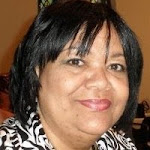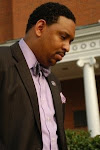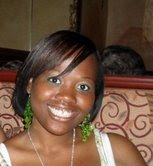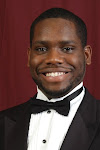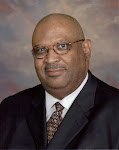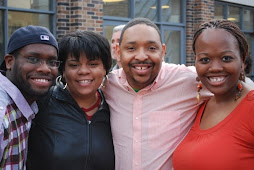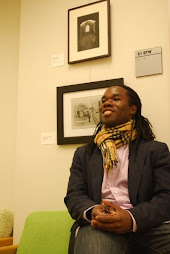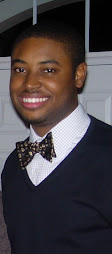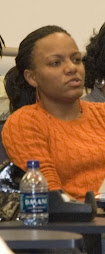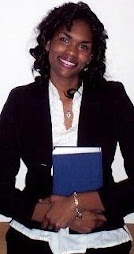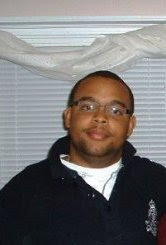Monday, October 27, 2008
BSU President Wallace Baxter III to appear on Panel
Ethics, Theology and Civic Engagement Take II-What Students Say...Date: TODAY, Oct. 27 Time: 12:20 - 1:20 p.m.Location: 0015W
Wednesday, October 15, 2008
Panel on Black Church and Presidential politics

On October 21st, BSU requested 300-500 word submissions from the student body to respond to Dr. Carter's article in the latest "Gatherings" issue titled, "The Black Church & Presidential Politics." Several students responded to the event. Students wrote a brief response, raising observations, critiques and/or questions for further discussion.
The students included:
Donyelle McCray Bernard, 1st year Th. D student
Ashon Crawley 1st year Ph. D Candidate
Amey Victoria Adkins 3rd year M. Div candidate
Reginald D. Patterson 3rd year Ph.D candidate
Read a submission from 1 of our distinguished guests:
"Mas Moun Barack: A Caribbean Carnival Allegory of Senator Obama" by Reginald Patterson candidate for Romance Studies, Duke University.
On February 5th 2008, Senator Barack Obama won become was crowned the Mardi Gras King of the United States upsetting the crowds supporting his valiant contenders. Though a carefully crafted discourse of dissidence, Barack convinced a mosaic of twenty-four states as well as the previous states, that he, indeed, should be crowned to fully realize the goal of the American Constitution.
While doing preliminary dissertation work in Guadeloupe, French West Indies, I had the privilege of seeing Senator Barack Obama and the presidential race to the White House though a different mask. The Super Tuesday victory of the presidential hopeful rightly coincided with the liturgical calendar of the Carnival Season. While doing my work in Guadeloupe, I also had the burden of defending not only Barack Obama and our electoral system, but also that of contextualizing Senator Obama’s heavily coded and signified speak for an African Diasporic Audience with whom African American share a long history—The Afro-French-Caribbeans.
The French Caribbean, as does the United States, has a rich history of political revolutions by either due to classicism and/or racism. While in Guadeloupe, I presented a speech allegorizing “Martin Luther the King the Second” and Senator Obama through the rhetoric of particularities of the Guadeloupean Carnivalesque Season. Due to the fact that Carnival in the Caribbean including New Orleans and the Civil Rights Movement of the 1960’s share a rhetoric of radical redefinitions of social spaces—marches, sit-ins, boycotts—I found that figurative “crowing” of Obama offers an alternative poetic of this historic race not only in entertaining ways of naming him a King, but also that of the ritualistic sacrifice that takes place through the agents of Carnival.
Ultimately, the question of Senator Obama multi-national background can be analyzed in a poetic of masks given his perceived racial ambiguity as métisse. In addition, , his has a number of dialogic discourses winking not only at the Black Church, by speaking in many langues (French for “tongues”) calling for a Joshua Generation Revolution and a breaking down of wall of a Post-Modern Jericho.
The students included:
Donyelle McCray Bernard, 1st year Th. D student
Ashon Crawley 1st year Ph. D Candidate
Amey Victoria Adkins 3rd year M. Div candidate
Reginald D. Patterson 3rd year Ph.D candidate
Read a submission from 1 of our distinguished guests:
"Mas Moun Barack: A Caribbean Carnival Allegory of Senator Obama" by Reginald Patterson candidate for Romance Studies, Duke University.
On February 5th 2008, Senator Barack Obama won become was crowned the Mardi Gras King of the United States upsetting the crowds supporting his valiant contenders. Though a carefully crafted discourse of dissidence, Barack convinced a mosaic of twenty-four states as well as the previous states, that he, indeed, should be crowned to fully realize the goal of the American Constitution.
While doing preliminary dissertation work in Guadeloupe, French West Indies, I had the privilege of seeing Senator Barack Obama and the presidential race to the White House though a different mask. The Super Tuesday victory of the presidential hopeful rightly coincided with the liturgical calendar of the Carnival Season. While doing my work in Guadeloupe, I also had the burden of defending not only Barack Obama and our electoral system, but also that of contextualizing Senator Obama’s heavily coded and signified speak for an African Diasporic Audience with whom African American share a long history—The Afro-French-Caribbeans.
The French Caribbean, as does the United States, has a rich history of political revolutions by either due to classicism and/or racism. While in Guadeloupe, I presented a speech allegorizing “Martin Luther the King the Second” and Senator Obama through the rhetoric of particularities of the Guadeloupean Carnivalesque Season. Due to the fact that Carnival in the Caribbean including New Orleans and the Civil Rights Movement of the 1960’s share a rhetoric of radical redefinitions of social spaces—marches, sit-ins, boycotts—I found that figurative “crowing” of Obama offers an alternative poetic of this historic race not only in entertaining ways of naming him a King, but also that of the ritualistic sacrifice that takes place through the agents of Carnival.
Ultimately, the question of Senator Obama multi-national background can be analyzed in a poetic of masks given his perceived racial ambiguity as métisse. In addition, , his has a number of dialogic discourses winking not only at the Black Church, by speaking in many langues (French for “tongues”) calling for a Joshua Generation Revolution and a breaking down of wall of a Post-Modern Jericho.
Dr. Willie Jennings Teaches Slavery and Obedience: Spring 2009
For those looking for courses next Spring, Slavery and Obedience has received rave reviews from students at the Divinity School.  This course examines the theological architecture of Christian obedience. It will examine obedience in relation to its historic social couplet – slavery. Slavery, especially in its modernist reformulation from the 14th century forward, framed the problems of Christian obedience with great urgency. The goal of this course will be to formulate a theology of obedience that is attuned to questions of identity,history, and the ongoing realities of global slavery and its social and economic echoes. Such a theology would articulate more deeply what it means to be an obedient church. This course is taught by the brilliant Dr. Willie Jennings.
This course examines the theological architecture of Christian obedience. It will examine obedience in relation to its historic social couplet – slavery. Slavery, especially in its modernist reformulation from the 14th century forward, framed the problems of Christian obedience with great urgency. The goal of this course will be to formulate a theology of obedience that is attuned to questions of identity,history, and the ongoing realities of global slavery and its social and economic echoes. Such a theology would articulate more deeply what it means to be an obedient church. This course is taught by the brilliant Dr. Willie Jennings.
 This course examines the theological architecture of Christian obedience. It will examine obedience in relation to its historic social couplet – slavery. Slavery, especially in its modernist reformulation from the 14th century forward, framed the problems of Christian obedience with great urgency. The goal of this course will be to formulate a theology of obedience that is attuned to questions of identity,history, and the ongoing realities of global slavery and its social and economic echoes. Such a theology would articulate more deeply what it means to be an obedient church. This course is taught by the brilliant Dr. Willie Jennings.
This course examines the theological architecture of Christian obedience. It will examine obedience in relation to its historic social couplet – slavery. Slavery, especially in its modernist reformulation from the 14th century forward, framed the problems of Christian obedience with great urgency. The goal of this course will be to formulate a theology of obedience that is attuned to questions of identity,history, and the ongoing realities of global slavery and its social and economic echoes. Such a theology would articulate more deeply what it means to be an obedient church. This course is taught by the brilliant Dr. Willie Jennings. Tuesday, October 7, 2008
WORSHIP SERVICE AT MT. LEVEL
BSU kicked off it's semester with a worship service at Dr. Turner's church, Mt. Level Missionary Baptist church. Several students and faculty from Duke were in attendance including Dr. Turner, and Dr. Curtis Freeman. Duke Divinity School's newly formed gospel choir was in attendance singing mighty praises to our God and King. In addition, Wallace Baxter, BSU president was our guest speaker for the evening. Afterwards, BSU members headed to a fellowship dinner at Golden Corral.
Program for event:
BSU Welcoming Program
Mt. Level Missionary Baptist Church
Rev. Dr. William Turner, Senior Pastor
*********************************
Mr. Wallis Baxter III, BSU President
Mr. Ángel Gallardo, BSU Program Chair
Praise & Worship- Duke Divinity School Guest Gospel Choir
Prayer - Minister Angela Taylor and Sister Tasha Gibson, BSU Co-chaplains
Welcome from Office of Black Church Studies
Rev. Tiffany Marley, Director – Office of Black Church Studies
Song Selection – Duke Divinity School Guest Gospel Choir
History & Introduction of Black Seminarians Union
Ms. Kaneasha Shackleford, BSU Historian
Introduction of Preacher – Ángel J. Gallardo, BSU Program Chair
Song Selection – Duke Divinity School Guest Gospel Choir
Preacher-Wallis Baxter III, BSU President
Invitation to Christian Discipleship - Boris Bayless, BSU Parliamentarian
Offering-Lyle Pointer, BSU Treasurer
Closing Remarks-Kamille Williams, BSU Secretary
Benediction- Wallis Baxter III, BSU President
Program for event:
BSU Welcoming Program
Mt. Level Missionary Baptist Church
Rev. Dr. William Turner, Senior Pastor
*********************************
Mr. Wallis Baxter III, BSU President
Mr. Ángel Gallardo, BSU Program Chair
Praise & Worship- Duke Divinity School Guest Gospel Choir
Prayer - Minister Angela Taylor and Sister Tasha Gibson, BSU Co-chaplains
Welcome from Office of Black Church Studies
Rev. Tiffany Marley, Director – Office of Black Church Studies
Song Selection – Duke Divinity School Guest Gospel Choir
History & Introduction of Black Seminarians Union
Ms. Kaneasha Shackleford, BSU Historian
Introduction of Preacher – Ángel J. Gallardo, BSU Program Chair
Song Selection – Duke Divinity School Guest Gospel Choir
Preacher-Wallis Baxter III, BSU President
Invitation to Christian Discipleship - Boris Bayless, BSU Parliamentarian
Offering-Lyle Pointer, BSU Treasurer
Closing Remarks-Kamille Williams, BSU Secretary
Benediction- Wallis Baxter III, BSU President
Why Duke Black Seminarians Love "Coming to America"
 On Friday, October 3, Seminarians came for an evening of fun and fellowship to watch "Coming to America." This event was held at the home of BSU member Angela Taylor.
On Friday, October 3, Seminarians came for an evening of fun and fellowship to watch "Coming to America." This event was held at the home of BSU member Angela Taylor.Every year that we've been at Duke Divinity School, BSU has had a special showing of the eighties favorite, "Coming to America." Yes, it's a funny movie, but for us it is so much more. It is a movie about class (remember the dad who owns a Mcdonalds-like restaurant versus the barbers in the barbershop?), gender (the princess to be that barks like a dog?) and ontological strugglings of Black American life (the jerry curl boyfriend/ family/good hair complex).
Yes, we certainly laugh at the outrageous bridal song, "She's your queen to be," but we should be looking at the comparison of Murphy's African paradise and the ruins of Africanism and it's values as depicted in his view of Black American life when he arrives. What do Africans see about African-Americans when they "Come to America?"
Photo date: 1988 "Coming to America" Eddie Murphy Photo by Bruce McBroom - © MPTV - Image courtesy MPTV.net
Subscribe to:
Posts (Atom)


